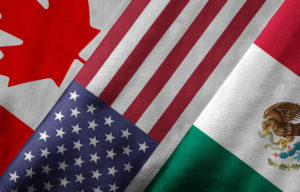News & Insights
NAFTA Is Dead – Long Live the “U.S. – Mexico Trade Agreement” in Principle?
Today, the Office of the U.S. Trade Representative (USTR) announced that the United States and Mexico reached a “preliminary agreement in principle,” subject to finalization and implementation, to update the North America Free Trade Agreement (NAFTA). The USTR stated that the preliminary accord contains “modern provisions representing a 21st century, high-standard agreement.” The agreement, which will be named the “U.S.-Mexico Trade Agreement” will reportedly be signed by the U.S. and Mexico later this week, and the negotiators are continuing to work to bring Canada into the new agreement.
Key provision of the agreement in principle, as described by the USTR, are as follows—
- New Rule of Origin for Automotive Content: The new rule of origin will require that 75% of auto content be made in the U.S. and Mexico.
- New Hourly Wage Requirement: The agreement will require that 40% – 45% of auto content be made by workers earning at least $16/hour.
- New procedures for streamlining the certification and verification of the rules of origin—though details have not yet been released.
- New De Minimis Shipment Value: The agreement would raise the de minimis shipment value level from $50 to $100—shipment values up to the $100 level would be subject to informal entry requirements and enter Mexico free of duties, fees and taxes.
- Status Quo for Agricultural Products: The agreement reportedly maintains the duty-free status of certain agricultural products traded between the two countries; however, there may be new labeling and health standards requirements.
- Status quo for the existing investor dispute settlement process for the energy and telecommunications sectors.
- Sunset Provisions: The US had previously insisted on a review and either reenactment or termination of the NAFTA after five (5) years. Under the new agreement, the parties will review the agreement after six (6) years.
- Intellectual Property: The agreement will require enforcement authorities to stop goods suspected of being pirated or counterfeited at all ports of entry, require increased criminal penalties for camcording movies, require increased civil and criminal penalties for satellite and cable signal theft, and require broad protection against trade secret theft including against state-owned enterprises. The agreement will also require full national treatment for copyright and related rights so that U.S. creators are not deprived of their rights in foreign markets. It would also establish a notice-and-takedown system for copyright safe harbors for Internet service providers (ISPs) that provides protection for IP and predictability for legitimate technology enterprises who do not directly benefit from the infringement, consistent with United States law.
- Digital Trade: The new Digital Trade chapter will prohibit customs duties and non-tariff barriers from being applied to digital products that are distributed electronically between the countries, ensure that suppliers are not restricted in their use of electronic authentication or electronic signatures, guarantee that enforceable consumer protections (e.g., privacy and unsolicited communications) apply in the digital marketplace, and limit governments ability to require disclosure of proprietary computer source code and algorithms, to better protect the competitiveness of digital suppliers.
- Financial Services: The agreement would require national treatment to ensure that a Party does not discriminate against United States financial service suppliers, prohibit the imposition of certain quantitative and numerical restrictions that would limit the business of U.S. financial services suppliers, and require most-favored nation treatment to ensure that a part does not discriminate in favor of another party or a non-party. The agreement would also prohibit local data storage requirements in circumstances where a financial regulator has the access to data that it needs to fulfill its regulatory and supervisory mandate.
- Labor: The Labor chapter includes an Annex on Worker Representation in Collective Bargaining in Mexico, under which Mexico commits to specific legislative actions to provide for the effective recognition of the right to collective bargaining. The Labor chapter also requires the Parties to adopt and maintain in law and practice labor rights as recognized by the International Labor Organization, to effectively enforce their labor laws, and not to waive or derogate from their labor laws. It also includes new provisions to take measures to prohibit the importation of goods produced by forced labor, to address violence against workers exercising their labor rights, and to ensure that migrant workers are protected under labor laws. Further, to support North American jobs, the deal requires new trade rules of origin to drive higher wages by requiring that 40-45 percent of auto content be made by workers earning at least $16 USD per hour.
- Environment: The Environment chapter includes environmental obligations such as prohibitions on some of the most harmful fisheries subsidies, such as those that benefit vessels or operators involved in illegal, unreported, and unregulated (IUU) fishing. There will reportedly be new protections for marine species like whales and sea turtles, including a prohibition on shark-finning and commitment to work together to protect marine habitat. There will also be obligations to enhance the effectiveness of customs inspections of shipments containing wild fauna and flora at ports of entry and ensure strong enforcement to combat IUU fishing. The agreement will contain provisions to improve air quality, prevent and reduce marine litter, support sustainable forest management, and ensure appropriate procedures for environmental impact assessments.
Once the agreement is signed, it must then be implemented into the countries’ national laws.To read the USTR’s announcement, see: https://ustr.gov/about-us/policy-offices/press-office/press-releases/2018/august/modernizing-nafta-be-21st-century.
Miller Proctor Law PLLC is continuing to monitor the situation closely, as well as ongoing negotiations with Canada. If you have any questions about the NAFTA, the agreement in principle, or other import or export-related issues, please contact Melissa Proctor (melissa@millerproctorlaw.com).
News & Insights

Senate Overwhelmingly Passes USMCA, Entry into Force Expected in Mid-2020
On January 16, 2020, the U.S. Senate passed the US-Mexico-Canada Agreement (“USMCA”), which modifies, updates and will replace the North American Free Trade Agreement (“NAFTA”). The Senate vote was 89-10 in favor of the updated trade agreement. President Trump is

List 3 Tariffs under Section 301 Action against China Slated to Take Effect on September 24th
On September 17th, the USTR issued the final list of items that will be subject to the new set of tariffs to be imposed under the Section 301 action against China. On the same day, the President issued a statement


